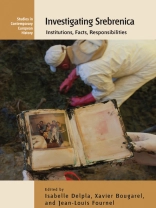In July 1995, the Bosnian Serb Army commanded by General Ratko Mladic attacked the enclave of Srebrenica, a UN “safe area” since 1993, and massacred about 8, 000 Bosniac men. While the responsibility for the massacre itself lays clearly with the Serb political and military leadership, the question of the responsibility of various international organizations and national authorities for the fall of the enclave is still passionately discussed, and has given rise to various rumors and conspiracy theories. Follow-up investigations by the International Criminal Tribunal for the former Yugoslavia and by several commissions have dissipated most of these rumors and contributed to a better knowledge of the Srebrenica events and the part played by the main local and international actors. This volume represents the first systematic, comparative analysis of those investigations. It brings together analyses from both the external standpoint of academics and the inside perspective of various professionals who participated directly in the inquiries, including police officers, members of parliament, high-ranking civil servants, and other experts. Evaluating how institutions establish facts and ascribe responsibilities, this volume presents a historiographical and epistemological reflection on the very possibility of writing a history of the present time.
Tabela de Conteúdo
List of maps
Acknowledgements
List of abbreviations and acronyms
List of the Srebrenica reports and websites
Chronology and Maps
Introduction: The Judge, the Historian, and the Legislator
Isabelle Delpla, Xavier Bougarel and Jean-Louis Fournel
Chapter 1. The ICTY Investigations
Jean-René Ruez
Chapter 2. Introduction to the “Report-Form”: Characteristics and Temporalities of a Production of Public Truth
Jean-Louis Fournel
Chapter 3. Reassessing the French Parliamentary Fact-Finding Mission on Srebrenica
Pierre Brana
Chapter 4. A Tale of Two Commissions: Dutch Parliamentary Inquiries during the Srebrenica-Aftermath
Christ Klep
Chapter 5. Reflecting on the Dutch NIOD Report: Academic Logic and the Culture of Consensus
Pieter Lagrou
Chapter 6. Reopening the Wounds? The Parliament of Bosnia-Herzegovina and the Question of Bosniak Responsibilities
Xavier Bougarel
Chapter 7. The Long Way to Admission: The Report of the Government of the Republika Srpska
Michèle Picard and Asta Zinbo
Chapter 8. Facts, Responsibility, Intelligibility: Comparing the Investigations and Reports
Isabelle Delpla
Bibliography
Notes on contributors
Index
Sobre o autor
Jean-Louis Fournel is Professor at the University of Paris VIII. His research focuses on the history of warfare, political thought, and the rhetoric of the Italian Renaissance. Between 1997 and 2001, he directed several European cooperation programs with universities in Bosnia- Herzegovina. In 1994, while the city was under siege, he co-organized the initiative for a sister relationship between his university and that of Sarajevo.












